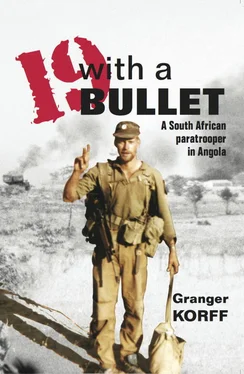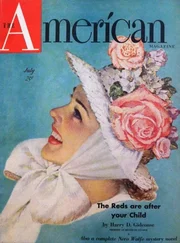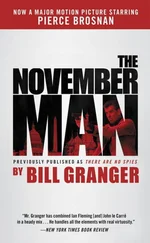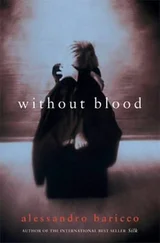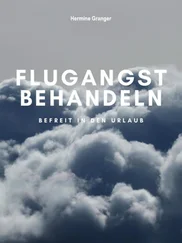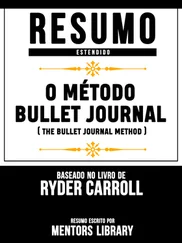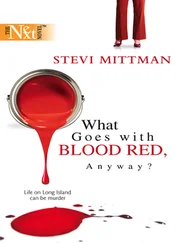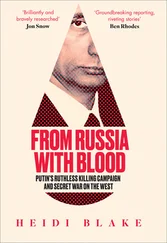I was determined to carry on. I had screwed up once at the preliminary tests at Engineers, and if it wasn’t for the Engineers’ lieutenant who had plucked me from failure and pushed me into line I would not be here. I wasn’t going screw up again. I was going to get my wings if I had to lose all my fucking toes for them. I gritted my teeth and pressed on.
“C’mon… do it! This is what it takes… don’t stop now!” I found that one of the tricks to ease the pain was to keep moving. I wouldn’t stop moving during the short smoke breaks between PT classes, and would shuffle around or walk on the spot as if doing a rain-dance while I quickly smoked a cigarette. Every day the instructors would encourage us to report sick or sit out for a while if we couldn’t carry on, and then laugh as they wrote those who did so off the course. I knew that if I made one word of complaint about my feet I would be off the course and RTU’d
“Just think to the next second… no further.”
Every morning at 05:00 roll call, under the big parade-ground floodlights, there were always a couple of guys missing who just couldn’t get out of bed to carry on. Already our class had shrunk from 50-odd men to less than twenty. Every full day of PT ended with a 15-kilometre run and every night I pulled out another toenail and tossed it in the trash.
My feet had became a conversation piece in the bungalow at night, with guys crowding around to see the injury and wondering how much longer I could hack it.
“Your feet are pretty fucked up, mate,” said John Delaney, a cocky, John Travolta lookalike from the south of Jo’burg, who would later become a good friend.
“We’ve still got a week to go and they say that it’s going to be even tougher— you’d better get some painkillers or something, or you wont make it with those feet,” he said matter-of-factly.
“Yeah, if I sick-report for pain pills even once I’m off anyway, so I might as well carry on.”
John nodded in support.
“It’s only five more days. If I drop off I’ll regret it for years,” I said with false bravado.
“Well, I have to tell you…” said a blond-haired troop a couple of beds down from me, “when I see you get up early in the morning and bandage your feet it helps me go on, because if you can carry on with those feet, then I can also push on.”
Another troop laughed from across the bungalow and agreed with him.
One afternoon we were split into eight-man teams and each team was assigned one of the steel 200-kilogram vehicle parachute pallets that stood in a pile next to the hangar. We were told to carry it for 21 kilometres without the big pallet touching the ground. We thought they must surely be joking, because we could barely pick the thing up and carry it past the camp gates without wincing in pain, never mind carry it for 21 kilometres. It wasn’t a joke. The pallets were not only very heavy— so much so, in fact, that six men could just about shuffle with one on their shoulders—but they weren’t designed to be carried and had sharp edges that cut into your shoulder, no matter how you tried to carry them, making the whole business almost unbearable after just a few minutes .
Six guys would be carrying the pallet while the other two took a ‘sanitykeeping break’ of about a minute. We alternated almost continually, with the front guys eventually ending up at the back resting for a minute before they started at the front again. If you were the two guys at the back who were next in line for a break, your mind would almost be at breaking point from having carried the thing for something like five minutes and having moved from the front to the middle, and then to the back position. The men who were resting had to keep running to stay up with the team. Nevertheless, we got it past the gate and ran like this for 21 blood-and-sweat-soaked, non-stop kilometres across long open fields and endless dusty sand roads, with our instructor behind us, carrying a long switch. One of the guys on our team, a ‘Dutchman’, an Afrikaner, nicknamed Cheese, lost his mind at some point. He screamed and sobbed and had to be slapped repeatedly across the face to get him to get a grip on himself, because if one man cracked and gave up the team was sunk.
Comfortably numb—Roger Waters
Cheese thanked us afterwards for the face-slappings and said that was what snapped him out of the hell. By this time my feet were numb, but I knew the damage that was being done with each step. So we bit the proverbial bullet and somehow our class came in first. It was the first and last time that they used the steel pallets. When the top brass heard about it they banned the pallets from being used on future PT courses because they were too gruelling for the troops. Some guys really broke down after that run. They went back to using telephone poles and tyres.
Suddenly, one afternoon at 16:00, it was all over. Two hundred of us stood on the parade ground; all that was left from the 700 hopefuls. Two companies of paratroopers. We had made it through the PT course. Two weeks of nonstop PT. I smiled stupidly, shook my head and swore with sheer relief.
After a week’s break to recover, the next step for everybody was the threeweek jump course. For me, it was hobbling straight to the hospital in sandals, where a horrified doctor looked at me strangely after checking my feet and immediately gave me enough antibiotics to kill a horse and three weeks’ light duty, also in sandals. I had lost all my toenails. He could not believe that I had gone for two weeks with feet in that condition. He shook his head as if disgusted with the army and muttered something in Afrikaans. I said nothing. I spent that day—and the next few weeks— once again comfortably numb from double doses of the strong painkillers he had given me.
My feet would take years to fully recover and were to give me trouble throughout my whole military service. The rest of the guys from the newly formed D Company went off to do the three-week jump course while I worked in the stores on light duty. I would do the jump course a month later with H Company. I found myself side by side with the shit-head staff sergeant who wouldn’t change my boots in the first place. He was a real prick, oblivious to the suffering and pain he had caused me, but needless to say I got the perfect size boots for myself. I also picked up some old, faded uniforms, which was cool because all of us had stiff, brand-new brown uniforms. Only after a long time and many washes would they fade to a light khaki colour, the symbol of an ou man , an ‘old man’, a veteran.
One crisp winter morning we were all standing stiffly on the parade ground as usual when the fish eagles in the huge aviary at the battalion gates whooped loudly. Eight large trucks, billowing black smoke, came roaring through the gates, past the admin offices and pulled up to a stop on the parade ground, sending a cloud of brown dust drifting over us. The open trucks were piled high with brown kit bags. Wild-eyed troops with long hair bleached blond from the sun and uniforms faded almost to white leaped out from the backs of the closed trucks.
They were all tanned a deep brown, while well-used R4 rifles hung loosely from their shoulders and long bush knives hung from their web belts. Some had monkeys sitting on their shoulders or clutched under their arms as they passed bulging kit bags down from the trucks. They all jabbered excitedly to one another, hardly taking notice of us and giving the distinct impression of a group of men that had been very close for a very long time. They were one of the senior operational paratrooper companies, just arrived from the hot, dry South West African/Angolan border, which was a four-hour flight from the northwest in a C-130.
Читать дальше
